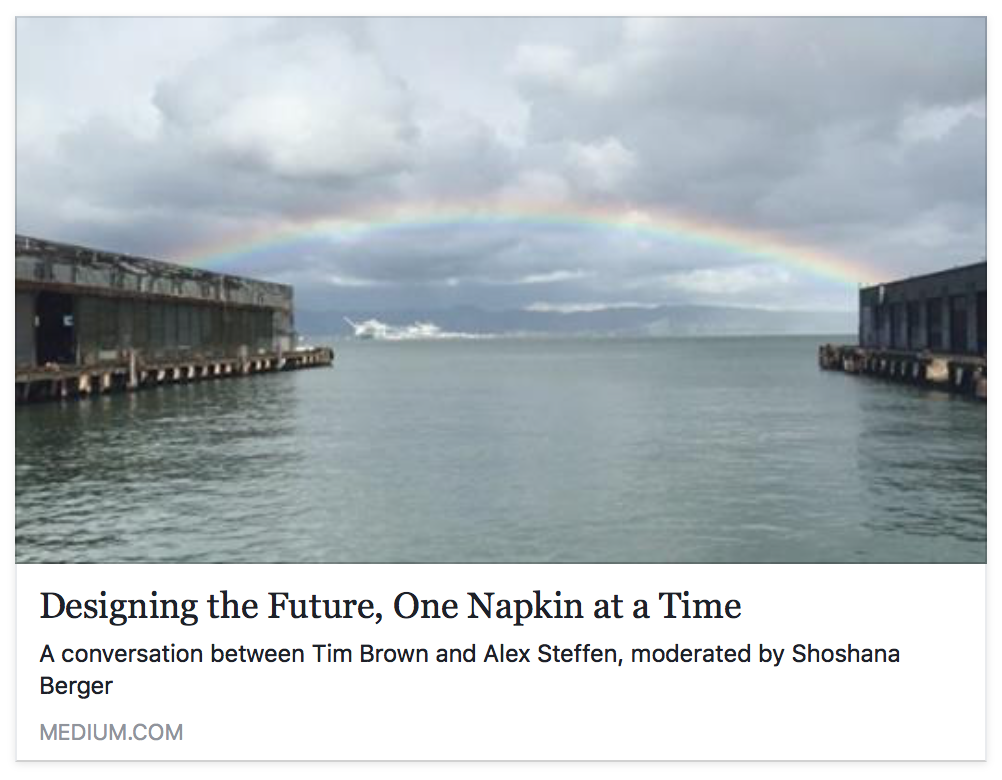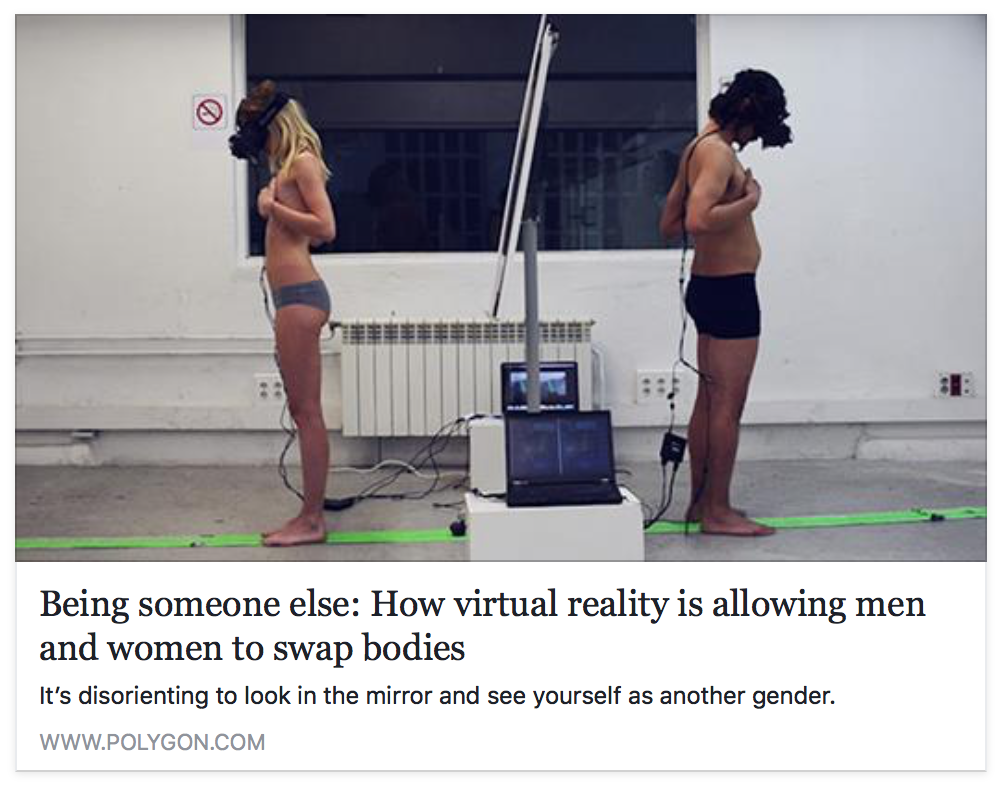Future Of Food /
Journal Of Design and Science /
Looking forward diving into..
"The MIT Media Lab and the MIT Press have jointly launched the Journal of Design and Science (JoDS), an online, open-access journal whose aim is to capture the antidisciplinary ethos of the MIT Media Lab while opening new connections between science and design."
Beyond the nuclear family /
Festival Digital /
Vanavond vertel ik op de opening van FESTIVAL DIGITAL (vr 19 februari) over de toekomst en het digitale.. #lookingforwardto
Designing Futures /
Beyond Dichotomic Thinking /
Changing Paradigms /
Empathy Foundation Ritual /
VR induced empathy experiments. Reminds me of the Empathy Foundation Ritual I created for OUR at 'Future Fictions' at Z33 Art Center #futureofdemocracy #pantopicon #foam
A Ride Into A Hybrid Future /
(Repost of an editorial I've written for and was published by Copenhagen Institute of Futures Studies)
Societies in the developed world today have access to two ways of transportation, private and public, which exist alongside each other. We believe the combination of Driverless Cars, the Digital Wallet Revolution and the Sharing Economy points in the direction of a new type of hybrid mobility system. One without clear boundaries between private and public transport, at least from a functional design point of view.
From Ownership To Access
Mobility startups within the Sharing Economy walk a fine line between private ownership and public transport, indicating an evolution towards fuzzy borders between previously strictly separated systems.
The Sharing Economy is leading way to a world where access to goods becomes more important than ownership. Startups like Uber, Lyft, Djump, Zipcar and BlaBlaCar are amongst the most well known examples of shared mobility - providing alternatives for public taxi services and opening up the idea of sharing rides with others beyond the known economically beneficial services like tram or metro.
Read MoreOn Educational Incubators, Self Actualization and Jobs of the Future /
Although the developed world has seen a triple growth in GDP, studies show no similar growth in terms of happiness compared to previous generations. This abundance gap is stirring debate on our society's priorities, not in the least from an educational point of view.
Our educational system dates back to a time before the Internet made knowledge a commodity. It is in essence an industrial model of education - a manufacturing model, based on linearity, conformity and batching people -, created to prepare for jobs alike.
In those days robotization was not yet lurking around the corner and outsourcing blue & white collar jobs to the developing world was unheard of. Students were being prepared for a workforce based upon the same mechanical model the educational system was built on, with efficiency, rationality and conformity as values. The kind of algorithmic jobs that will soon become a scarcity in the developed world.
If we want to prepare our students for tomorrow’s instead of yesterday’s jobs and life, it is in urgent need for an update. Let’s take a look at some of the trends shaping the emerging new educational model.
Read MoreOur Mourning Experience. Redesigned. /
In recent years the circular economy has served as a coherent framework for systems re-design, for reinventing different processes and parts of our society. We are moving from a mindset of unlimited availability of resources, linear production & consumption cycles and a mechanical worldview into one characterized by circular, closed systems where waste has been designed out of the picture.
The Nike Considered Index and the Upcycling trend are amongst the most well known examples of production and consumption processes being transformed away from the linear into the circular.
A great, recent example in an area where we least expect it, is the advent of Biodegradable Urns. Those are funerary urns made from biodegradable materials which turn you into a tree after you die. Inside the urn is a pine seed, which can be replaced by any other seed or plant, and will grow to remember your loved one by. That way Bios Urn transforms death into life through nature.
Imagine forests and parks as the cemeteries of the future, with living trees replacing tombstone as tokens of remembrance. And, hence connecting our need for a farewell ritual not only to a powerful new narrative, but holding the potential for changing our societies mourning experience in it's wake.
Experience design is the practice of designing products, processes, services, events, and environments with a focus placed on the quality of the user experience and culturally relevant solutions.
The idea of converting cemeteries into forests and parks, and death into life, can be considered a wonderful example of experience design. Imagine the family gathering for a summer picnic besides grandfather's tree. Or a teenager enjoying some alone time on a grey autumn afternoon, writing in her journal, headphones on, with her back supported by the tree planted in honour of her best friend who recently passed away. That way, the creation of spaces in which life and death are intertwined, not only allows for remembrance but for new ways of togetherness, beyond "death do us part".
The Rise Of "Dark Tourism" /
Dark Tourism, as in tourists visiting warzones as travel destinations, is on the rise. And although war tourism is nothing new, the sheer commercialization of it is. For a few thousand dollars, so-called "dark tourism" agencies will help you explore Afghanistan, the Gaza Strip, and other conflict-scarred regions of the world.
future coolness with a touch of vintage /
In a bold move to combine vintage coolness with a vision of the future, Swedish artist Jacob Munkhammar created the Flying Citroen Cars Series. A creative series which transforms old Citroen cars into flying vehicles.
Europe's New Emigration Class /
With high youth unemployment rate in Europe (up to 25% in countries like Spain and Greece)... young educated millennials are forced to be creative. Add a longing to pursue a well-lived life and a higher level of mobility than previous generations, and it's not surprising to find a niche of them moving to less developed countries, to set up a (local) business there. At a fraction of the European and in a far less developed market, those new emigrants are at once creating an adventurous life while achieving feasible business goals.
monogamy, the next new frontier? /
A recent Gallup poll which resulted in near unanimous disapproval of cheating also found rising acceptance of many other non-traditional, consensual sexual relationships. The new ethical consensus that you can do whatever you like as long as you are not hurting anyone — and as long as you’re being rigorously candid— reflects a thoroughly modern mix of tolerance and puritanical censoriousness. We’ve become more willing to embrace diverse models of sexual self-expression even as we’ve become ever more intolerant of hypocrisy and the human frailty which makes hypocrisy almost inevitable.
A Google search for “ethical non-monogamy” yields plenty of results about polyamory and open marriage. It also brings up sex columnist Dan Savage’s notion of “monogamish" relationships, in which partners pledge enduring emotional commitment while enjoying "flings, affairs, three-ways, and swinging experiences."
And if you get stuck how do you get unstuck? /
Unstuck.com
Eton college, alma mater to many of the British establishment including the serving Prime Minister and the mayor of London, has partnered with Emerge Venture Lab, a London-based accelerator, to support educational technology, or 'edtech' start-ups.
One type of innovative ideas that they are particularly interested in, is linked in to a structural aspect they believe is an important aspect of their job (albeit one existing education technology startups have not yet examined in detail): learning students to grow up and dealing with life's ups and downs.
As Unstuck App reveals, the development of innovative (technological) ideas linked to providing 'emotional developmental support' is not limited to the traditional education context only.











